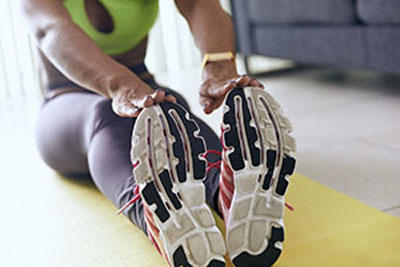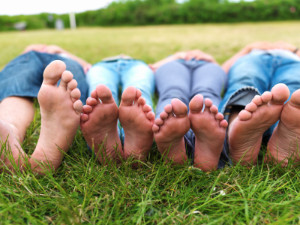Items filtered by date: September 2021
What Causes Cracked Heels?
 When the skin on the heel dries out and loses its strength and elasticity, the heel becomes hard, dry, and flaky. This leads to splitting, or fissuring and cracking, of skin around the heel which is more commonly known as cracked heels. While cracked heels usually form because of dry skin, wearing open-backed shoes, gaining weight, and increased friction from the back of the shoes can all lead to cracked heels forming as well. Common methods for managing cracked heels include moisturizing the heels twice per day, soaking the feet in warm water, and using a pumice stone on the affected area. However, excessively dry skin can indicate other problems such as neuropathy or diabetes. Patients who continually struggle with cracked heels should consult with a podiatrist to find the source of their issue.
When the skin on the heel dries out and loses its strength and elasticity, the heel becomes hard, dry, and flaky. This leads to splitting, or fissuring and cracking, of skin around the heel which is more commonly known as cracked heels. While cracked heels usually form because of dry skin, wearing open-backed shoes, gaining weight, and increased friction from the back of the shoes can all lead to cracked heels forming as well. Common methods for managing cracked heels include moisturizing the heels twice per day, soaking the feet in warm water, and using a pumice stone on the affected area. However, excessively dry skin can indicate other problems such as neuropathy or diabetes. Patients who continually struggle with cracked heels should consult with a podiatrist to find the source of their issue.
Cracked heels are unsightly and can cause further damage to your shoes and feet. If you have any concerns, contact one of our podiatrists from Toms River Podiatrist . Our doctors can provide the care you need to keep you pain-free and on your feet.
Cracked Heels
Cracked heels appear unappealing and can make it harder for you walk around in sandals. Aside from looking unpleasant, cracked heels can also tear stockings, socks, and wear out your shoes. There are several methods to help restore a cracked heel and prevent further damage.
How Do You Get Them?
Dry skin is the number one culprit in creating cracked heels. Many athletes, walkers, joggers, and even swimmers suffer from cracked heels. Age and skin oil production play a role to getting cracked heels as well.
Promote Healing
Over the counter medicines can help, especially for those that need instant relief or who suffer from chronic dry feet.
Wear Socks – Wearing socks with medicated creams helps lock in moisture.
Moisturizers – Applying both day and night will help alleviate dryness which causes cracking.
Pumice Stones – These exfoliate and remove dead skin, which allows for smoother moisturizer application and better absorption into the skin.
Change in Diet
Eating healthy with a well-balanced diet will give the skin a fresh and radiant look. Your body responds to the kinds of food you ingest. Omega-3 fatty acids and zinc supplements can also revitalize skin tissue.
Most importantly, seek professional help if unsure how to proceed in treating cracked heels. A podiatrist will help you with any questions or information needed.
If you have any questions, please feel free to contact our office located in Toms River, NJ . We offer the newest diagnostic and treatment technologies for all your foot care needs.
Caring for Your Child’s Feet
Good foot care is not beneficial only for adults, but also for children. You can put your child on the path to a lifetime of healthy feet by following a few simple tips. If you have a young child, let them walk around barefoot where it is safe to do so. Young, growing feet build strength and flexibility as they walk barefoot. Wash and dry your child’s feet daily to promote good foot hygiene and prevent skin and nail problems. Trim your child’s toenails regularly, cutting them straight across and not too short to reduce the risk of ingrown toenails. Finally, choose the right shoes and socks for your child. They should fit the child’s feet well, be supportive and comfortable, and be made of breathable materials. If your child complains of any foot pain, or if you notice any worrisome changes to their feet, please consult with a podiatrist.
Making sure that your children maintain good foot health is very important as they grow. If you have any questions, contact one of our podiatrists of Toms River Podiatrist . Our doctors can provide the care you need to keep you pain-free and on your feet.
Keeping Children's Feet Healthy
Having healthy feet during childhood can help prevent medical problems later in life, namely in the back and legs. As children grow, their feet require different types of care. Here are some things to consider...
Although babies do not walk yet, it is still very important to take care of their feet.
Avoid putting tight shoes or socks on his or her feet.
Allow the baby to stretch and kick his or her feet to feel comfortable.
As a toddler, kids are now on the move and begin to develop differently. At this age, toddlers are getting a feel for walking, so don’t be alarmed if your toddler is unsteady or ‘walks funny’.
As your child gets older, it is important to teach them how to take care of their feet.
Show them proper hygiene to prevent infections such as fungus.
Be watchful for any pain or injury.
Have all injuries checked by a doctor as soon as possible.
Comfortable, protective shoes should always be worn, especially at play.
If you have any questions please feel free to contact our office located in Toms River, NJ . We offer the newest diagnostic and treatment technologies for all your foot and ankle needs.

